#agile consulting
Explore tagged Tumblr posts
Text
When Creativity Took Over Our Webinar…

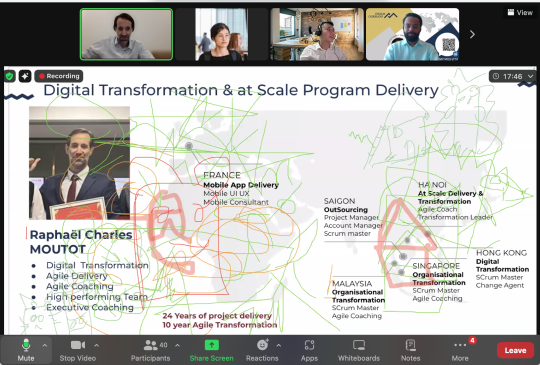
In May, my former colleague and now friend, Mauro, had the opportunity to co-host the monthly event of the PMI Institute, Vietnam Chapter.
The event's format was quite unique, it was divided into two parts:
The first part, led by organizers Phil and Tran Anh, introduced agile concepts.
The second part was an open discussion between Mauro and me titled "How Marketing Can Leverage Agility" (based on our experience merging the two domains).
Phil aimed to spark creativity with an engaging activity:
"Draw, draw, draw! A shape in 6 steps. Keep drawing!"
Phil instructed participants to draw a spaceship, ice cream cone, house, hedgehog, fox, cat, coffee cup, and bear – all within 15-20 seconds each! It was definitely a fast-paced challenge.
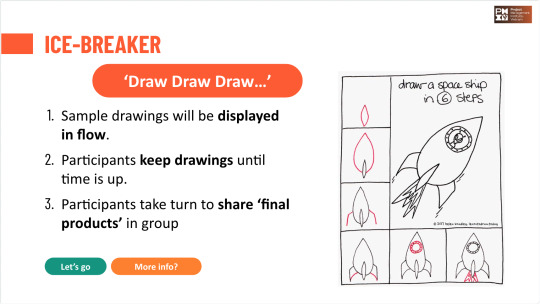
While participants were expected to draw on paper and share their creations at the end, some discovered a way to utilize Zoom's drawing feature, allowing them to draw directly on the main screen! Unexpected, to say the least! ^^
While humorous and surprisingly creative, this unexpected turn of events caused some stress for the organizers.
Look at these artworks! Colorful, aren't they?
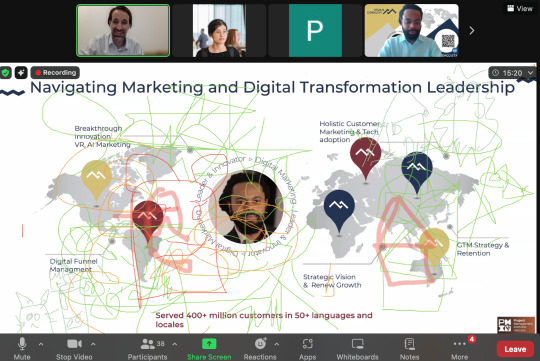
The biggest challenge? No one could figure out how to remove the drawings! Thankfully, with a smile and the participants' help, we managed to adapt to this unforeseen situation – a testament to the importance of being prepared for the unknown! :)
We then moved on to the second part, where we addressed the following questions for the PMI VNC audience:
Context, concepts, and the evolution from traditional project management and marketing to this stage.
Successes and challenges of combining Agile and Marketing.
Case studies or use cases for overcoming challenging situations in Agile.
Predictions and changes in Agile and MarTech for the next decade.
The top 3 takeaways for the audience.
In order to discover more, please let me invite you to access the full recording of the event (clic on the link bellow ):
When Agility Meets marketing: PMI Vietnam Chapter
Webinar Passcode: 0*1yseBK
Although you could already listen to this part in the recording, I still would like to share with your my 3 key takeaways from our webinar to conclude this short article:
1. A Fantastic Learning Community: Everyone involved in making this event a success is fortunate. Presenters have the opportunity to share their expertise, participants gain insights into a potentially unfamiliar field, and everyone benefits from exposure and the chance to connect with new people. This exemplifies a community driven by curiosity, openness, and professionalism.
2. Embrace Change: Things Don't Always Go According to Plan. While staying true to the original objective is important, everyone should be prepared for deviations. Establish mechanisms to handle and anticipate unexpected situations, such as implementing shorter release cycles, adjusting marketing campaigns, or even being prepared for technical difficulties during webinars.
3. Reinvent Your Role: Change is the Only Constant. Equip yourself to adapt to change, continuously learn more. We already leverage various forms of AI to boost productivity. Marketing, Agile, and AI are not separate entities. It's time to get creative and leverage the best aspects of all three (and potentially even more) to excel.
Once again, thanks to Mauro, Phil, Tran Anh and the 41 souls who join this webinar!
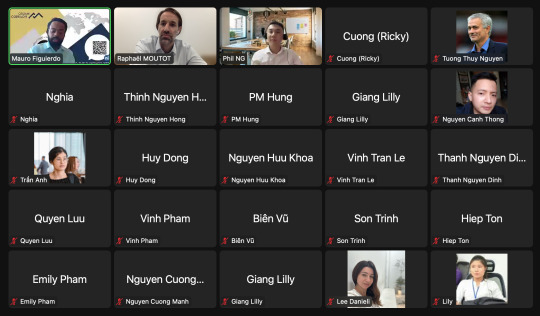
0 notes
Text
Unlocking Success with Agile Consulting
In today's fast-paced business landscape, agile consulting has emerged as a game-changer for organizations striving to stay ahead of the curve. With the rapid evolution of technology and market dynamics, traditional project management approaches often fall short in meeting the demands of modern businesses. This is where agile project management steps in, offering a flexible and adaptive framework that empowers teams to respond effectively to change and deliver value iteratively.
The Rise of Agile Consulting
As businesses recognize the need for agility in their operations, the demand for agile consulting companies has soared. These firms specialize in helping organizations embrace agile methodologies, providing tailored solutions to navigate complex challenges. Whether it's implementing Scrum, Kanban, or other agile frameworks, these consulting firms bring expertise and experience to the table, guiding clients toward sustainable success.
Tailored Agile Consulting Services
At the forefront of the agile consulting realm are companies dedicated to delivering exceptional agile consulting services
. These services encompass a wide range of offerings, including:
Agile Transformation: Guiding organizations through the transition to agile methodologies, fostering a culture of collaboration and continuous improvement.
Training and Coaching: Equipping teams with the necessary skills and knowledge to adapt and thrive in an agile environment, through targeted training programs and ongoing coaching support.
Process Optimization: Agile consulting Streamlines workflows and enhances productivity by identifying and eliminating bottlenecks, optimizing processes for maximum efficiency.
Strategic Planning: Aligning agile initiatives with business objectives, developing roadmaps and strategies to drive sustainable growth and innovation.
Change Management: Managing the human side of change, ensuring smooth transitions and stakeholder buy-in throughout the agile journey.
Agile Consulting in South Africa
Agile consulting South Africa is gaining significant traction among forward-thinking organizations. As businesses strive to adapt to rapidly changing market conditions and customer expectations, agile methodologies offer a path to resilience and competitiveness. With a burgeoning ecosystem of agile consulting providers, South African companies have access to world-class expertise and support to embark on their agile journey with confidence.
Navigating Agile Implementation Challenges
While the benefits of agile implementation are undeniable, the path to success is not without its challenges. From cultural resistance to organizational silos, there are numerous obstacles that can hinder the smooth adoption of agile practices. However, with the right guidance and support from experienced agile consulting partners, these challenges can be overcome, paving the way for sustained success and growth.
#agile consulting#agile project management#agile consulting companies#agile consulting services#agile consulting south africa#agile implementation
0 notes
Text
Unlock the potential of Agile methodology and gain excellence in your business operations with the seamless assistance of Benzne’s Agile Consulting services. In today’s fast-paced and competitive business landscape, the ability to adapt quickly and efficiently is crucial for success. With Benzne’s expertise in Agile practices, you can navigate this ever-changing environment with utmost ease.
0 notes
Text
In today's fast-paced digital landscape, effective application planning is crucial for successful development and delivery. Agile practices have gained immense popularity due to their flexibility, adaptability, and focus on delivering customer value.
In a study by Standish Group, agile projects were found to be 28% less likely to be canceled than traditional waterfall projects. They were also found to be 39% more likely to be delivered on time and on budget.
In this step-by-step guide, we will explore how to plan an application using Agile practices.
Whether you are a project manager, developer, or stakeholder, this guide will provide valuable insights to ensure a streamlined and efficient planning process.
From establishing project goals to creating a prioritized backlog and conducting iterative sprints, we will cover the key elements of Agile planning.
0 notes
Text
The Benefits of Agile Methodology for Software Development Projects
Agile methodology is like the Swiss army knife of software development projects. It's a grab-bag approach that can make even the most complex of tasks seem like a breeze. It not only forces people to communicate better, but it also gets everyone working together to build something great. There's an old saying that teamwork makes the dream work, and it couldn't be truer in this case. Instead of waiting until everything is perfect before moving onto the next step, Agile methodology tells us to forge ahead while keeping an eye on our end goal. With Agile comes flexibility, making it easier to change direction when necessary or even pivot entirely! So if you want a truly collaborative approach for your next software development project, then Agile is definitely the way to go!
Introduction to Agile Methodology
Agile methodology is a project management approach that emphasizes flexibility, collaboration, and customer satisfaction. It was developed as a response to the traditional, rigid, and sequential approach to software development known as the Waterfall model. Agile methodology is based on iterative and incremental development, meaning that software is developed in small, frequent releases, with continuous feedback and improvement throughout the development cycle.
Agile methodology values individuals and interactions over processes and tools, working software over comprehensive documentation, customer collaboration over contract negotiation, and responding to change over following a plan. It is designed to be adaptive and responsive to changing customer needs and project requirements, making it well-suited to software development projects that require frequent updates and changes.
Increased Flexibility and Adaptability
One of the primary benefits of Agile methodology is increased flexibility and adaptability. The iterative and incremental approach to development allows teams to respond quickly to changes in project requirements, customer needs, and market conditions. Instead of following a rigid plan, Agile teams are able to adjust their approach and priorities in response to new information and feedback.
This flexibility also allows Agile teams to deliver working software to customers more quickly and frequently, allowing for more rapid feedback and course correction. This reduces the risk of delivering a final product that doesn't meet customer needs or market demand, as teams are able to adjust their approach throughout the development process.
Additionally, the Agile approach values collaboration and communication between team members and stakeholders. This allows teams to work more closely with customers and end-users to ensure that the software being developed meets their needs and expectations. This collaboration also fosters a sense of ownership and accountability among team members, leading to more engaged and motivated teams.
2. Improved Collaboration and Communication
Another major benefit of Agile methodology is improved collaboration and communication. Agile teams emphasize working together closely and communicating effectively throughout the development process. This includes frequent stand-up meetings, sprint retrospectives, and other opportunities for team members to share progress, feedback, and ideas.
By fostering a culture of collaboration and open communication, Agile teams are better able to ensure that everyone is on the same page and working towards the same goals. This reduces the likelihood of misunderstandings or miscommunications, which can lead to costly delays or mistakes.
Improved collaboration and communication also leads to better teamwork and a more positive work environment. By working closely together and supporting each other, team members are more likely to feel valued and invested in the project. This can lead to higher job satisfaction and retention rates, as well as improved productivity and creativity.
Overall, the emphasis on collaboration and communication in Agile methodology helps ensure that everyone is working together effectively towards a common goal, which can lead to more successful software development projects.
3. Faster Time-to-Market
Another significant benefit of Agile methodology is faster time-to-market. Agile teams work in short development cycles called sprints, typically ranging from one to four weeks. At the end of each sprint, the team produces a working increment of the software that can be tested, demonstrated, and potentially released to customers.
This approach allows organizations to get their software to market more quickly than traditional software development methods. By breaking the project down into smaller, manageable pieces, the team can release functional software to users sooner and get feedback faster. This feedback loop enables the team to make improvements and adjust course as needed, which can help ensure that the final product meets the needs of users.
In addition, Agile methodology prioritizes the most important features and requirements early on in the development process, which means that these critical elements can be delivered first. This can be especially valuable for organizations working on software projects with rapidly-changing requirements or a competitive marketplace.
Overall, Agile methodology can help software organizations like Zenkins get their software to market faster and more efficiently, which can provide a competitive advantage and lead to increased revenue and customer satisfaction.
4. Enhanced Quality Control and Testing
Another benefit of Agile methodology is enhanced quality control and testing. With Agile, testing and quality control are integrated into every stage of the development process. This means that testing is not just limited to the end of the project, but is instead an ongoing process that occurs throughout the entire project lifecycle.
This allows for quicker identification and resolution of defects, reducing the risk of defects in the final product. Additionally, the frequent testing and quality control measures ensure that the final product meets the customer's requirements and is of high quality.
Agile also encourages a culture of continuous improvement, where the team is constantly looking for ways to improve the quality of the product and the development process itself. This results in a more refined and efficient development process, leading to higher quality products that are more likely to meet customer expectations.
5. Greater Customer Satisfaction
Agile methodology is also known for providing greater customer satisfaction. Since the customer is involved in every stage of the development process, their feedback is incorporated into the product as it is being developed. This means that the final product is more likely to meet the customer's needs and expectations, resulting in greater customer satisfaction.
Additionally, since Agile methodology focuses on delivering working software in shorter iterations, the customer can see progress being made and provide feedback throughout the development process. This allows the customer to have more control over the final product and ensures that the end result meets their requirements.
Furthermore, the focus on continuous improvement in Agile methodology means that the team is always looking for ways to enhance the product and the development process to better meet the customer's needs. This leads to a better understanding of the customer's requirements and a final product that is more likely to satisfy their needs, resulting in increased customer satisfaction.
6. Reduced Risk of Project Failure
Agile methodology also helps reduce the risk of project failure by breaking down the development process into small, manageable chunks that can be continuously tested and improved upon. This approach allows for early detection and correction of errors, preventing major setbacks and reducing the likelihood of project failure. Additionally, the regular feedback and collaboration with stakeholders and customers throughout the development process ensures that the final product meets their needs and expectations, further reducing the risk of project failure.
7. Continuous Improvement and Iteration
Continuous improvement and iteration are another key benefit of agile methodology. By breaking down the development process into small, iterative cycles, agile allows for constant feedback and collaboration from stakeholders and customers. This allows for quick adjustments and improvements to be made throughout the development process, resulting in a better end product. Additionally, by regularly reviewing and adjusting the development process itself, agile teams can identify and address inefficiencies, leading to further process improvements and increased productivity over time.
8. Cost Savings and ROI
Agile methodology can also lead to cost savings and a positive return on investment (ROI) for software development projects. By prioritizing features and requirements based on their value to the customer, agile teams can avoid wasting time and resources on features that may not be necessary or useful. Additionally, agile's focus on constant testing and feedback can help identify and address issues earlier in the development process, reducing the likelihood of costly rework or project failure. This leads to a more efficient development process and ultimately lower costs for the project overall. Finally, by delivering a higher quality end product that meets customer needs and expectations, agile can lead to increased revenue and ROI for the organization.
Latest trends in Agile Methodology for Software Development Projects
Some of the latest trends in Agile Methodology for software development projects include:
DevOps Integration: DevOps and Agile methodologies share similar values, and organizations are looking to integrate DevOps practices to improve the speed and efficiency of software development.
Remote Collaboration: The COVID-19 pandemic has accelerated the trend of remote work, and Agile methodology has adapted to it by emphasizing virtual collaboration tools and remote project management practices.
Value-Driven Development: Agile methodology is increasingly focused on delivering value to the customer, and organizations are prioritizing features and tasks based on customer needs and feedback.
Scaling Agile: Agile methodologies were originally designed for small, co-located teams, but they are now being scaled up to accommodate larger, more complex projects and distributed teams.
Agile in Non-IT Areas: Agile methodologies were originally developed for software development, but they are now being applied to other areas, such as marketing, sales, and HR.
Agile in Regulated Industries: Agile methodology is being increasingly adopted in regulated industries, such as healthcare and finance, where compliance and risk management are critical.
Agile Data Analytics: Agile methodology is being applied to data analytics projects, allowing teams to quickly iterate and deliver insights to stakeholders.
Overall, Agile methodology is evolving to meet the changing needs of software development projects and other areas of business, emphasizing flexibility, collaboration, and value delivery.
7 Ways to Improve Your Agile Software Development Process
Why Agile is the Future of Software Development
Agile is the future of software development because let's face it, in this fast-paced digital world, no one has time for drawn-out waterfall methodologies. By using Agile, teams can quickly adapt to changing requirements as they arise and prioritize features based on customer feedback. Plus, with Agile, gone are the days of waiting months or even years for a finished product - instead, you get a workable prototype every few weeks. This iterative approach not only saves time and resources but also allows for continuous improvement and reduces the risk of failure. The flexibility and adaptability offered by Agile allow teams to quickly respond to changing requirements and customer feedback, while enhanced collaboration and communication improve team productivity and morale. Faster time-to-market and improved quality control help organizations stay competitive in today's fast-paced business environment, and continuous improvement and iteration allow for ongoing process optimization. Additionally, Agile can help reduce the risk of project failure, save costs, and provide a better ROI. With the latest trends in Agile such as DevOps and Lean Agile, it is clear that Agile methodology will continue to play a major role in software development in the years to come. So if you're ready to ditch the old-school methods and embrace a more flexible, collaborative way of building software, then Agile is definitely worth embracing.
1 note
·
View note
Text
Statistical Tools
Daily writing promptWhat was the last thing you searched for online? Why were you looking for it?View all responses Checking which has been my most recent search on Google, I found that I asked for papers, published in the last 5 years, that used a Montecarlo method to check the reliability of a mathematical method to calculate a team’s efficacy. Photo by Andrea Piacquadio on Pexels.com I was…

View On WordPress
#Adjusted R-Squared#Agile#AI#AIC#Akaike Information Criterion#Akaike Information Criterion (AIC)#Algorithm#algorithm design#Analysis#Artificial Intelligence#Bayesian Information Criterion#Bayesian Information Criterion (BIC)#BIC#Business#Coaching#consulting#Cross-Validation#dailyprompt#dailyprompt-2043#Goodness of Fit#Hypothesis Testing#inputs#Machine Learning#Mathematical Algorithm#Mathematics#Mean Squared Error#ML#Model Selection#Monte Carlo#Monte Carlo Methods
2 notes
·
View notes
Text
#DevOps lifecycle#components of devops lifecycle#different phases in devops lifecycle#best devops consulting in toronto#best devops consulting in canada#DevOps#kubernetes#docker#agile
2 notes
·
View notes
Text
#certified agile coach#agile coaching#enterprise agile coach#scrum master agile coach#certified enterprise coach#atlassian jira training#atlassian training#confluence training#jira and confluence training#atlassian bitbucket training#atlassian classes#consultant#consulting
2 notes
·
View notes
Text
Training consulting companies in Philadelphia
Discover top training consulting companies in Philadelphia, specializing in customized employee development, leadership training, and organizational effectiveness. Enhance skills, boost productivity, and drive business success through expert-led programs tailored to your needs.

#jira assessment#azure devops training#hire scrum master#agile brains consulting#jira administrator projects
0 notes
Text
0 notes
Text
When HR partners up with Agile to run a Kaizen program
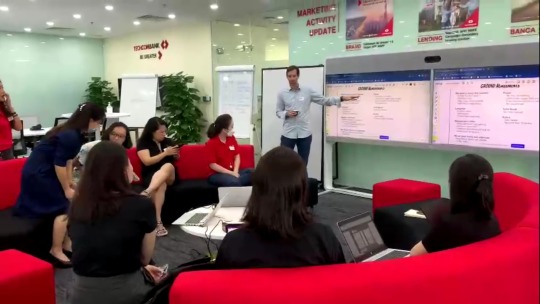
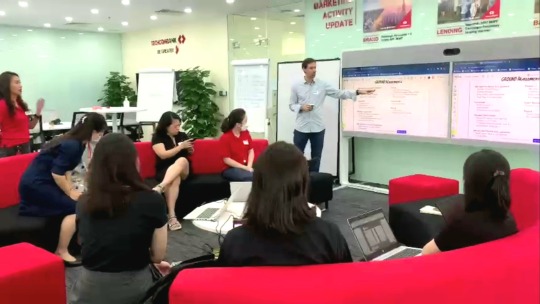
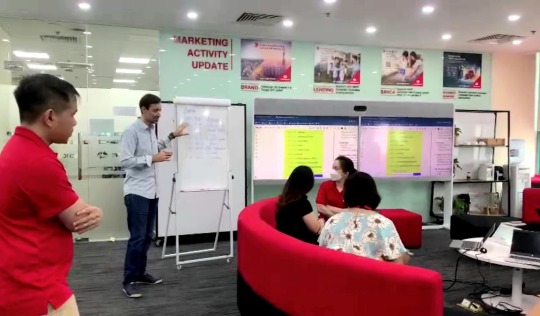
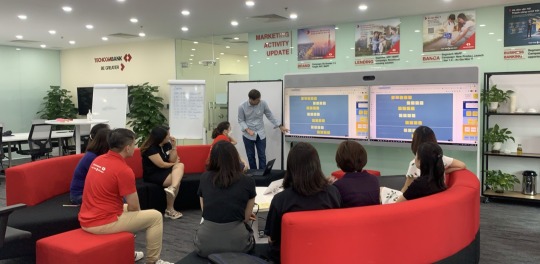
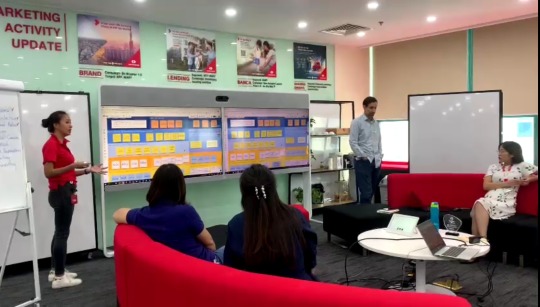
August 2022, The Agile Center of Excellence partnered with Human Resource (incdluing the fantastic Ha Bui) to ensure smooth onboarding and active engagement in the WeKaizen development program.
-------------
Let's first have a look at WeKaizen's missions:
Empowering Employees: Enhance Kaizen capabilities through Lean Production training, equipping all employees with the essential skills and mindset to drive continuous improvement.
Cultivating a Kaizen Culture: Promote implemented Kaizen initiatives, fostering instant reward and recognition to incentivize participation and celebrate success
--------------
Let me precise that WeKaizen program is open to all Techcombank employees, encompassing everyone from top managers to regional relationship managers. WeKaizen program encourages participants to identify areas for improvement in internal processes and even discover simple ways to boost employee happiness:
No problem is too small or too big, isn't it?!
Here are the key areas where we provided crucial support:
Kaizen Practice - Collaborative Problem-Solving Teams brainstorm and collaborate to devise solutions (Kaizen) for specific team challenges.
Kaizen Fair - Showcasing Excellence Recognizing and rewarding outstanding individuals and teams with the most impactful Kaizen initiatives.
The HR team actually entrusted our members with their foundational coaching skills to guide participants in refining their ideas and achieving success.
In a coaching point of view, our success hinges on our ability to help participants transform their initial ideas into concrete concepts with actionable plans.
Despite considerable workload pressures facing our team with delivering the bank's core functionalities, the Head of Transformation and the new Head of Agile approached me with this request.
Partnering with my experienced colleague Son Le and the energetic Hien Nhu, they were the perfect fit! Togehter we embarked on this initiative, initially with some reservations about tackling complex problems with diverse groups for next following Saturdays...




The experience proved to be absolutely rewarding and engaging!
While numerous pre-existing canvases (Lean Startup Canvas, Product Canvas, Team Canvas, etc.) existed, I, after thorough research, proposed using a novel canvas tailored to encourage emergent concepts through Design Thinking methodologies.
The Proposed Canvas:
Inspired by a Business Case Canvas and a Product Vision template, here's the structure we suggested for facilitating the exercise:
Why? Identify the problem/opportunity and the overall vision to address it.
What? Describe the potential solution to tackle the identified issue.
End User? Define the individuals most impacted by the problem or the prime beneficiaries of the solution.
What the Success looks like? Outline the idealistic impact on users and the market if the solution is implemented.
Success Measurement: Determine the key metrics to gauge success.
Timeline & Milestones: Establish a feasible timeline and key milestones for achieving the desired outcome.
How-To: Define the essential steps to bring the solution to life.
Who's Involved? Identify the necessary team members or profiles required for implementation.
Stakeholders: Pinpoint sponsors and individuals accountable for the initiative's success.
Resources: Determine the necessary technical components and procurement needs.
Constraints: Acknowledge and understand the current limitations.
Risk Assessment: Identify and address potential risks.
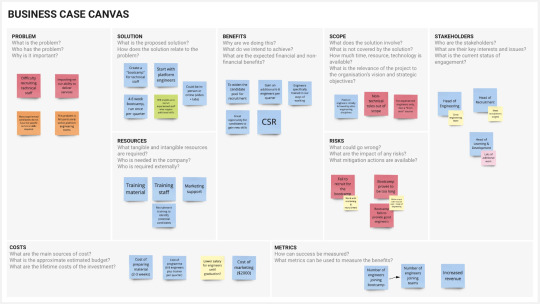
Through collaborative refinement sessions with various groups, our team successfully enhanced over 20 Canvases. Additionally, we equipped participants with effective pitching skills to present their ideas within a five-minute timeframe. Remember that the most impactful Canvases will be presented to the bank's divisional heads.
We were excited to witness the continued success of the WeKaizen program and the positive impact it is having on Techcombank!
#productvision#Kaizen#banking#coaching#agile consulting#agile coach#team coaching#techcombank#vision#scrummaster
0 notes
Text
Mastering Agile Consulting: Elevate Your Project Management Game
Agile Consulting: A Paradigm Shift in Project Management
In today's fast-paced business landscape, agile consulting has emerged as a game-changer for organizations striving to stay ahead of the curve. Unlike traditional project management methodologies, agile offers a flexible and iterative approach that fosters collaboration, adaptability, and continuous improvement.
Understanding Agile Project Management
Agile project management is built on the principles of transparency, collaboration, and responsiveness. It empowers teams to break down complex projects into manageable increments, known as sprints, allowing for regular feedback and course correction. By prioritizing customer satisfaction and embracing change, agile methodologies enable organizations to deliver high-quality products and services efficiently.
The Role of Agile Consulting Companies
As businesses increasingly recognize the value of agility, the demand for agile consulting companies has surged. These firms specialize in guiding organizations through the transition to agile methodologies, providing expertise, training, and support every step of the way. From initial assessment to implementation and beyond, agile consultants serve as trusted partners in driving organizational transformation.
Unlocking Value with Agile Consulting Services
The benefits of agile consulting services extend far beyond improved project outcomes. By embracing agility, companies can foster a culture of innovation, resilience, and continuous learning. Agile methodologies empower teams to adapt to market changes swiftly, seize new opportunities, and deliver greater value to customers.
Agile Consulting in South Africa: Leading the Digital Transformation
Agile consulting South Africa is reshaping the business landscape, fueling digital transformation and fostering growth. From startups to enterprises, organizations across various industries are turning to agile methodologies to navigate uncertainty, drive innovation, and deliver exceptional customer experiences. With its emphasis on collaboration and adaptability, agile consulting is helping South African businesses thrive in today's dynamic marketplace.
Key Considerations for Agile Implementation
While the benefits of agile are undeniable, successful implementation requires careful planning and execution. Here are some key considerations to keep in mind:
1. Leadership Buy-In
Effective agile implementation begins at the top. Leadership buy-in is essential to foster a culture of agility and support the necessary changes throughout the organization.
2. Training and Education
Investing in training and education is crucial to equip teams with the skills and mindset needed to embrace agile methodologies fully.
3. Cross-Functional Collaboration
Agile thrives on cross-functional collaboration. Encouraging open communication and collaboration across departments is essential to maximize the benefits of agile.
4. Iterative Improvement
Continuous improvement is at the heart of agile. Encourage teams to reflect on their processes regularly and identify opportunities for refinement.
5. Flexibility and Adaptability
Agile is all about embracing change. Encourage teams to remain flexible and adaptable in the face of evolving requirements and market conditions.
#agile consulting#agile project management#agile consulting companies#agile consulting services#agile consulting south africa#agile implementation
0 notes
Text
Best Agile Training in India with Benzne- Your Expert Consulting Partner
Agile has gained significant popularity in India in recent years due to its iterative, incremental, and collaborative approach to project management. This flexible and adaptive way of working is based on the principle of continuous improvement, allowing teams to deliver value to their customers quickly and efficiently. If you are seeking the best agile training in India, look no further than Benzne. As a leading agile consulting and training company, Benzne offers a comprehensive range of agile courses and workshops designed to help you learn and apply agile principles and practices. Taught by experienced agile practitioners, these courses provide real-world insights and hands-on exercises to enhance your understanding and proficiency in agile methodologies.
Benzne's agile training in India offers numerous benefits for professionals seeking to excel in Agile. Firstly, you will learn from experienced agile practitioners who bring their practical knowledge and experiences into the training sessions. Secondly, the courses are highly interactive and engaging, allowing you to participate in hands-on exercises and simulations that reinforce your understanding of agile principles and practices.

Additionally, Benzne's agile training courses are accredited by renowned agile certification bodies like the Scrum Alliance and the Project Management Institute (PMI), ensuring that you receive industry-recognized certification upon completion. By partnering with Benzne, you will gain the knowledge and skills necessary to successfully implement Agile in your organization, driving improved business performance and customer satisfaction while fostering a collaborative and empowering work environment.
Top 5 Agile Consulting In India to Help In a Smooth Agile Transformation Journey
If you are considering an agile transformation, it is important to partner with qualified Agile training in India. An experienced Agile consultant can help you develop and implement a customized Agile strategy that is tailored to the specific needs of your organization.
Here are the top 5 Agile consulting in India to help you in a smooth Agile transformation journey:
Benzne- Benzne is a leading and top Agile training company. They offer a wide range of Agile services, including Agile training, Agile coaching, and Agile consulting. Benzne's team of experienced Agile practitioners can help you develop and implement a customized Agile strategy that is tailored to the specific needs of your organization.
LeanAgile- LeanAgile is another leading Agile consulting company in India. They offer a wide range of Agile services, including Agile training, Agile coaching, and Agile transformation consulting. LeanAgile's team of experienced Agile practitioners can help you to implement Agile practices across your entire organization, from the C-suite to the front lines.
AgileWaters- AgileWaters is a leading Agile training and consulting company in India. They offer a wide range of Agile services, including Agile training, Agile coaching, and Agile consulting. AgileWaters' team of experienced Agile practitioners can help you to develop and implement a customized Agile strategy that is tailored to the specific needs of your organization.
Prothoughts Solutions- Prothoughts Solutions is the best Agile consulting company in India. They offer a wide range of Agile services, including Agile training, Agile coaching, and Agile transformation consulting. Prothoughts Solutions' team of experienced Agile practitioners can help you to implement Agile practices across your entire organization, from the C-suite to the front lines.
Prudent- Prudent is an Agile consulting company in India. They offer a wide range of Agile services, including Agile training, Agile coaching, and Agile transformation consulting. Prudent's team of experienced Agile practitioners can help you develop and implement a customized Agile strategy that is tailored to the specific needs of your organization.
Why Choose Benzne as your agile consulting partner?
Benzne is a leading agile consulting and training company in India. They offer a wide range of agile services, including agile training, agile coaching, and agile consulting. Benzne's team of experienced agile practitioners can help you develop and implement a customized agile strategy that is tailored to the specific needs of your organization.
Here are a few reasons why you should choose Benzne as your agile consulting partner:
Experience: Benzne has over 10 years of experience in helping organizations to implement Agile. They have a proven track record of success in helping organizations improve their productivity, efficiency, and customer satisfaction.
Expertise: Benzne's team of agile practitioners has expertise in a wide range of industries and sectors. This means that they can tailor their agile solutions to the specific needs of your organization.
Customer focus: Benzne is committed to helping their clients achieve their agile goals. They work closely with their clients to understand their needs and to develop customized solutions that meet those needs.
Value for money: Benzne offers its services at competitive prices. They also offer a variety of discounts and packages to make their services even more affordable.
If you are looking for a qualified and experienced Agile consulting partner, then Benzne is the right choice for you. Benzne can help you to develop and implement a customized agile strategy that will help you to achieve your business goals.
0 notes
Text
Tactical Steps for a Successful GenAI PoC
New Post has been published on https://thedigitalinsider.com/tactical-steps-for-a-successful-genai-poc/
Tactical Steps for a Successful GenAI PoC


Proof of Concept (PoC) projects are the testing ground for new technology, and Generative AI (GenAI) is no exception. What does success really mean for a GenAI PoC? Simply put, a successful PoC is one that seamlessly transitions into production. The problem is, due to the newness of the technology and its rapid evolution, most GenAI PoCs are primarily focused on technical feasibility and metrics such as accuracy and recall. This narrow focus is one of the primary reasons for why PoCs fail. A McKinsey survey found that while one-quarter of respondents were concerned about accuracy, many struggled just as much with security, explainability, intellectual property (IP) management, and regulatory compliance. Add in common issues like poor data quality, scalability limits, and integration headaches, and it’s easy to see why so many GenAI PoCs fail to move forward.
Beyond the Hype: The Reality of GenAI PoCs
GenAI adoption is clearly on the rise, but the true success rate of PoCs remains unclear. Reports offer varying statistics:
Gartner predicts that by the end of 2025, at least 30% of GenAI projects will be abandoned after the PoC stage, implying that 70% could move into production.
A study by Avanade (cited in RTInsights) found that 41% of GenAI projects remain stuck in PoC.
Deloitte’s January 2025 The State of GenAI in the Enterprise report estimates that only 10-30% of PoCs will scale to production.
A research by IDC (cited in CIO.com) found that, on average, only 5 out of 37 PoCs (13%) make it to production.
With estimates ranging from 10% to 70%, the actual success rate is likely closer to the lower end. This highlights that many organizations struggle to design PoCs with a clear path to scaling. The low success rate can drain resources, dampen enthusiasm, and stall innovation, leading to what’s often called “PoC fatigue,” where teams feel stuck running pilots that never make it to production.
Moving Beyond Wasted Efforts
GenAI is still in the early stages of its adoption cycle, much like cloud computing and traditional AI before it. Cloud computing took 15-18 years to reach widespread adoption, while traditional AI needed 8-10 years and is still growing. Historically, AI adoption has followed a boom-bust cycle in which the initial excitement leads to overinflated expectations, followed by a slowdown when challenges emerge, before eventually stabilizing into mainstream use. If history is any guide, GenAI adoption will have its own ups and downs.
To navigate this cycle effectively, organizations must ensure that every PoC is designed with scalability in mind, avoiding common pitfalls that lead to wasted efforts. Recognizing these challenges, leading technology and consulting firms have developed structured frameworks to help organizations move beyond experimentation and scale their GenAI initiatives successfully.
The goal of this article is to complement these frameworks and strategic efforts by outlining practical, tactical steps that can significantly increase the likelihood of a GenAI PoC moving from testing to real-world impact.
Key Tactical Steps for a Successful GenAI PoC
1. Select a use case with production in mind
First and foremost, choose a use case with a clear path to production. This does not mean conducting a comprehensive, enterprise-wide GenAI Readiness assessment. Instead, assess each use case individually based on factors like data quality, scalability, and integration requirements, and prioritize those with the highest likelihood of reaching production.
A few more key questions to consider while selecting the right use case:
Does my PoC align with long-term business goals?
Can the required data be accessed and used legally?
Are there clear risks that will prevent scaling?
2. Define and align on success metrics before kickoff
One of the biggest reasons PoCs stall is the lack of well-defined metrics for measuring success. Without a strong alignment on goals and ROI expectations, even technically sound PoCs may struggle to gain buy-in for production. Estimating ROI is not easy but here are some recommendations:
Devise or adopt a framework such as this one.
Use cost calculators, like this OpenAI API pricing tool and cloud provider calculators to estimate expenses.
Instead of a single target, develop a range-based ROI estimate with probabilities to account for uncertainty.
Here’s an example of how Uber’s QueryGPT team estimated the potential impact of their text-to-SQL GenAI tool.
3. Enable rapid experimentation
Building GenAI apps is all about experimentation requiring constant iteration. When selecting your tech stack, architecture, team, and processes, ensure they support this iterative approach. The choices should enable seamless experimentation, from generating hypotheses and running tests to collecting data, analyzing results, learning and refining.
Consider hiring small and medium sized services vendors to accelerate experimentation.
Choose benchmarks, evals and evaluation frameworks at the outset ensuring that they align with your use case and objectives.
Use techniques like LLM-as-a-judge or LLM-as-Juries to automate (semi-automate) evaluation.
4. Aim for low-friction solutions
A low-friction solution requires fewer approvals and therefore, faces fewer or no objections to adoption and scaling. The rapid growth of GenAI has led to an explosion of tools, frameworks, and platforms designed to accelerate PoCs and production deployments. However, many of these solutions operate as black boxes requiring rigorous scrutiny from IT, legal, security, and risk management teams. To address these challenges and streamline the process, consider the following recommendations for building a low-friction solution:
Create a dedicated roadmap for approvals: Consider creating a dedicated roadmap for addressing partner-team concerns and obtaining approvals.
Use pre-approved tech stacks: Whenever possible, use tech stacks that are already approved and in use to avoid delays in approval and integration.
Focus on essential tools: Early PoCs typically don’t require model fine-tuning, automated feedback loops, or extensive observability/SRE. Instead, prioritize tools for core tasks like vectorization, embeddings, knowledge retrieval, guardrails, and UI development.
Use low-code/no-code tools with caution: While these tools can accelerate timelines, their black-box nature limits customization and integration capabilities. Use them with caution and consider their long-term implications.
Address security concerns early: Implement techniques such as synthetic data generation, PII data masking, and encryption to address security concerns proactively.
5. Assemble a lean, entrepreneurial team
As with any project, having the right team with the essential skills is critical to success. Beyond technical expertise, your team must also be nimble and entrepreneurial.
Consider including product managers and subject matter experts (SMEs) to ensure that you are solving the right problem.
Ensure that you have both full-stack developers and machine learning engineers on the team.
Avoid hiring specifically for the PoC or borrowing internal resources from higher-priority, long-term projects. Instead, consider hiring small and medium-sized service vendors who can bring in the right talent quickly.
Embed partners from legal and security from day 1.
6. Prioritize non-functional requirements too
For a successful PoC, it’s crucial to establish clear problem boundaries and a fixed set of functional requirements. However, non-functional requirements should not be overlooked. While the PoC should remain focused within problem boundaries, its architecture must be designed for high performance. More specifically, achieving millisecond latency may not be an immediate necessity, however, the PoC should be capable of seamlessly scaling as beta users expand. Opt for a modular architecture that remains flexible and agnostic to tools.
7. Devise a plan to handle hallucinations
Hallucinations are inevitable with language models. Therefore, guardrails are critical for scaling GenAI solutions responsibly. However, evaluate whether automated guardrails are necessary during the PoC stage and to what extent. Instead of ignoring or over-engineering guardrails, detect when your models hallucinate and flag them to the PoC users.
8. Adopt product and project management best practices
This XKCD illustration applies to PoCs just as it does to production. There is no one-size-fits-all playbook. However, adopting best practices from project and product management can help streamline and achieve progress.
Use kanban or agile methods for tactical planning and execution.
Document everything.
Hold scrum-of-scrums to collaborate effectively with partner teams.
Keep your stakeholders and leadership informed on progress.
Conclusion
Running a successful GenAI PoC is not just about proving technical feasibility, it’s about evaluating the foundational choices for the long term. By carefully selecting the right use case, aligning on success metrics, enabling rapid experimentation, minimizing friction, assembling the right team, addressing both functional and non-functional requirements, and planning for challenges like hallucinations, organizations can dramatically improve their chances of moving from PoC to production.
That said, the steps outlined above are not exhaustive, and not every recommendation will apply to every use case. Each PoC is unique, and the key to success is adapting these best practices to fit your specific business objectives, technical constraints, and regulatory landscape.
A strong vision and strategy are essential for GenAI adoption, but without the right tactical steps, even the best-laid plans can stall at the PoC stage. Execution is where great ideas either succeed or fail, and having a clear, structured approach ensures that innovation translates into real-world impact.
#2025#ADD#adoption#agile#ai#AI adoption#API#approach#apps#architecture#Article#assessment#benchmarks#box#Building#Business#business goals#cio#Cloud#cloud computing#code#collaborate#compliance#comprehensive#computing#consulting#data#data quality#deloitte#Design
0 notes
Text
Discover how partnering with TechMatrix Consulting, a Salesforce Platinum Consulting Partner, can maximize your CRM investment through certified experts, tailored solutions, and a proven track record across various industries.
#Salesforce Platinum Consulting Partner#TechMatrix Consulting#CRM solutions#certified Salesforce experts#tailored Salesforce solutions#industry experience#end-to-end Salesforce services#agile project execution#Salesforce implementation#post-implementation support#Salesforce integration#maximize ROI
0 notes
Text
The Indispensable Need for a Solid Strategy in an Agile Environment
I have just written a blog post for Teamprove GmbH about the importance of having a solid strategy in an Agile environment. You can find the blog post following this link:https://www.teamprove.de/blog/the-indispensable-need-for-a-solid-strategy-in-an-agile-environment/

View On WordPress
#Agile#Business#business consultant#Business strategy#Raffaello Palandri#Strategy#Strategy Consultant#Teamprove
11 notes
·
View notes